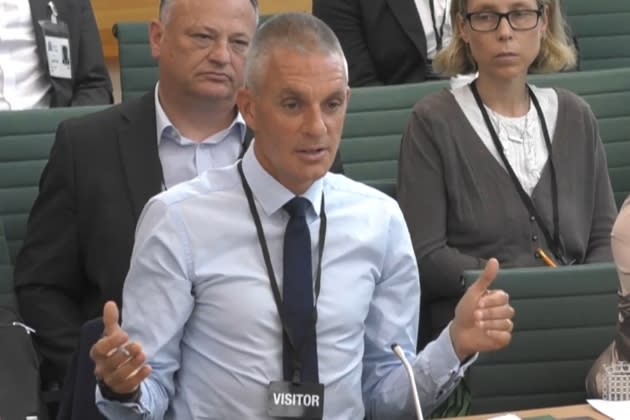BBC Director General Tim Davie On Digital Switchover: “We’re Not Putting A Date On It Or Anything Stupid Like That”

The BBC is “not proactively putting a date on a digital switchover or anything stupid like that,” Director General Tim Davie has said, but rather sparking a “broader conversation across the UK for when we do move across.”
Davie said today that linear TV channels will not be snatched away from older viewers, stating that he was “being provocative” in the recent landmark speech when he discussed an internet-only TV future.
More from Deadline
BBC News Anchor Exodus: Three Presenters Quit Ahead Of Divisive Channel Merger
BBC Developing Wagatha Christie Drama As Latest In 'A Very English Scandal' Strand
“We should have an aggressive plan but that is not a plan to remove things used by lots of people too soon,” he added, speaking to the UK government’s Public Accounts Committee.
“We’ve got a fantastic record of not leaving people behind and that is not part of the proposal.”
But while older viewers are more likely to watch linear, Davie said research shows when people over the age 65 move across to digital, “they don’t come back.”
In December’s RTS-organized speech, which generated multiple headlines about the future of the BBC’s linear channels, Davie told listeners to “imagine a world that is internet only, where broadcast TV and radio are being switched off and choice is infinite,” adding: “For the BBC, internet-only distribution is an opportunity to connect more deeply with our audiences and to provide them with better services and choice than broadcast allows.”
The speech kickstarted a major debate over the way in which the nation is consuming television but taking numerous questions during today’s hearing Davie clarified: “We’re not putting a date on the digital switchover or anything like that.”
Public Accounts Committee Chair Meg Hillier flagged research that 88% of BBC users still watch via linear and Davie said questions over broadband coverage will need to be “answered in a rigorous fashion before we engage in anything like a switchover [to internet-only].”
He stressed the digital switchover “is coming,” however, as the Committee probed a BBC digital-first plan that is seeing £300M ($364M) reinvested to drive a digital-first approach including £50M ($60M) a year on product development, which was revealed in May.
“Extreme challenges” are to come, Davie went on to say, with the license fee frozen for the next two years – losing the BBC hundreds of millions of pounds per year – while program costs rise.
He pointed to a fall of around 1,000 hours of original TV content this year to mitigate the struggles along with “aggressive plans” for £1.6B ($1.9B) turnover commercial arm BBC Studios, as the BBC battles to make huge savings.
“We’re having to box clever here,” he added. “Moving money around the BBC is very painful in itself. The decisions we have to make are unpopular.”
Staying away from “the herd”
Along with regulator Ofcom, the BBC is “looking at reform to respond flexibly to the market,” added Davie.
And he stressed the BBC is not the only media player struggling in today’s market, forecasting consolidation to come across the pond.
“Some of the newer media companies are yet to find sustainable economics,” he added. “I suspect there will be lots of movement in the market.”
Davie reiterated previous points that “with all the [market movement] swirling, the BBC is in a good position to maintain distinctiveness and not try and follow the herd.”
King Charles III Coronation
The corporation is also deep in planning mode for King Charles III’s Coronation and Eurovision, both of which fall in the same week in May.
“We’re in discussion with all parties to deliver flawless Coronation coverage and beyond,” added Davie. “Our biggest concern at the moment is demands on our Outside Broadcast service but we’re deep in planning.”
Elsewhere, Deadline revealed yesterday that three experienced news presenters have taken voluntary redundancy as the controversial merger of the international and domestic news channels draws near.
David Eades, Joanna Gosling and Tim Willcox chose not to enter a new recruitment process by which 15 presenters will be whittled down to six and Davie said efficiency savings have made the merger necessary, adding: “Voluntary redundancy is sad but you need less presenters and I think that’s appropriate.”
“Decisions needed to be made,” he said, of the merger. “We don’t think it’s efficient to have two separate processes and want to run a more integrated operation. No one else is running operations in this way.”
He stressed that the international offering will still be different to the UK’s. “It would be absurd if there was a big UK story to not have a team locally who can kick in and cover that story,” he added.
Pressed on whether BBC News’ coverage is too negative, Davie said “there is room for us to do more in terms of telling success stories.”
Culture Secretary Michelle Donelan revealed yesterday that the upcoming BBC mid-term review will focus heavily on impartiality and bias – one of the key planks of Davie’s approach since he took over in September 2020.
Best of Deadline
2022-23 Awards Season Calendar - Dates For The Oscars, Grammys, Guilds & More
TV Cancellations Photo Gallery: Series Ending In 2023 & Beyond
Hollywood & Media Deaths In 2023: Photo Gallery & Obituaries
Sign up for Deadline's Newsletter. For the latest news, follow us on Facebook, Twitter, and Instagram.
